Directors – Xie Junwei, Zou Jing – 2023 – China – Cert. 12a – 168m
****
General Gao Shi of the Tang dynasty recounts his life, his struggle to become a poet and his friendship with Li Bai, a more renowned poet – animated epic is out in UK cinemas on Friday, February 28th
Set roughly halfway through the Tang dynasty (618-907 A.D.), this lengthy, animated epic starts off like an historical war movie in the vein of the live action Red Cliff (John Woo, 2008, 2009) but swiftly morphs into something else entirely as this initial narrative about the capture and interrogation of an enemy soldier turns into a frame story – which is rather more than that, popping up repeatedly throughout the narrative with the frame story’s resolution taking centre stage towards the end of the proceedings. Even this is deceptive; while military strategy and conflict is covered, the narrative is far less interested in that than in the overall life of main protagonist and minor poet Gao Shi, his meetings and friendship through the years with secondary character and major poet Li Bai, and the wider poetry of the period.
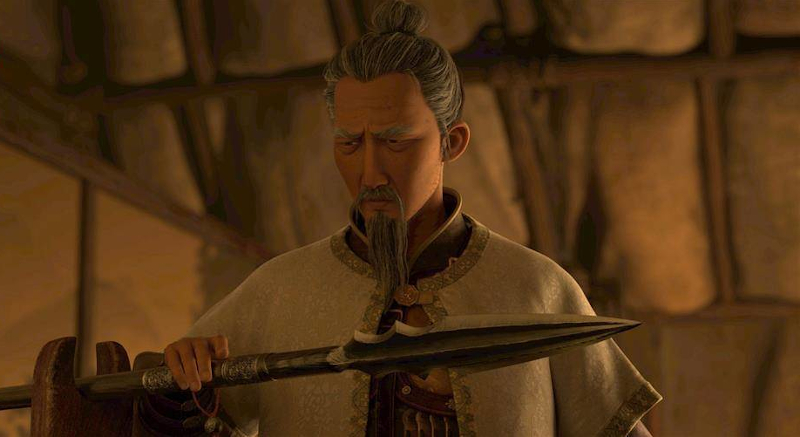
Believing himself about to be punished for the failure of his well planned and fought military campaign against the Tubos (the Tibetans, their ethnic identity never clarified within the film itself – at least, not in the English subtitles, presumably because the film is aimed at a Chinese audience who would already know this ethnic, historical; background), the ageing General Gao Shi (voice: Wu Junquan) falls neck first on his spear before receiving the Emperor’s emissary who wants to question him, it turns out, about not his military campaign but, rather, Li Bai. Thus, the General embarks on the long story of the two men’s friendship, and their numerous meetings over the years.
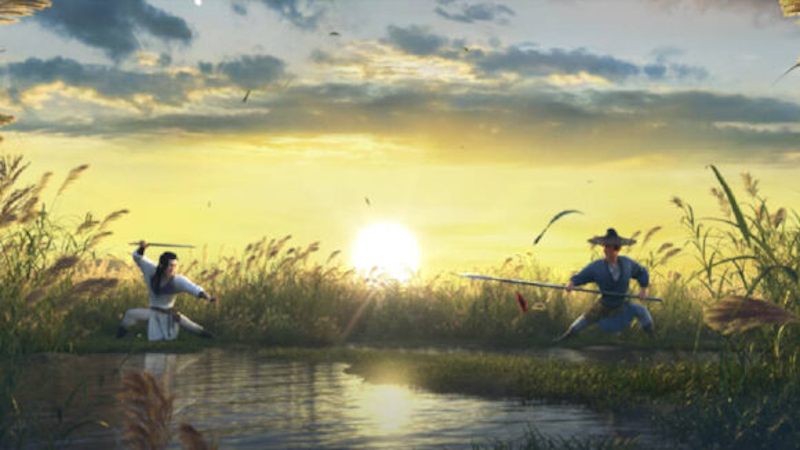
They first run into one another in a seemingly unprovoked fight on isolated grasslands in which the youthful Li Bai (voice: Ling Zhenhe) mistakes the youthful Gao Shi (voice: Yang Tianxiang) for the thief of his horse, something he won’t put up with since the beast is carrying the ashes of his dead friend which he wants to deliver to Wuhan province’s Yellow Crane Tower for burial. Gau Shi’s skill as a spearman is revealed, although, as we will see, he rarely gets the chance to show off this skill in actual battle as opposed to peacetime performance displays. Even in the military later in his career, much of his time is spent at a desk.
Li persuades Gao to teach him spearmanship in exchange for Li teaching Gao wrestling. In the course of their mutual lessons, they bond. Li wants to get ahead by making an impression on the governor, who refuses him an audience because he comes from a family which is merely merchant class and therefore not noble enough to take the necessary exam to become a state official. To console himself, Li drags Gau to the nearest hostelry overseeing the Yangtse River, and asks to be taken to the poetry boards, where they are shown a prized, eight-line poem by Cui Hau, the beauty of which overcomes Gau while Li resolves to write something even better himself.
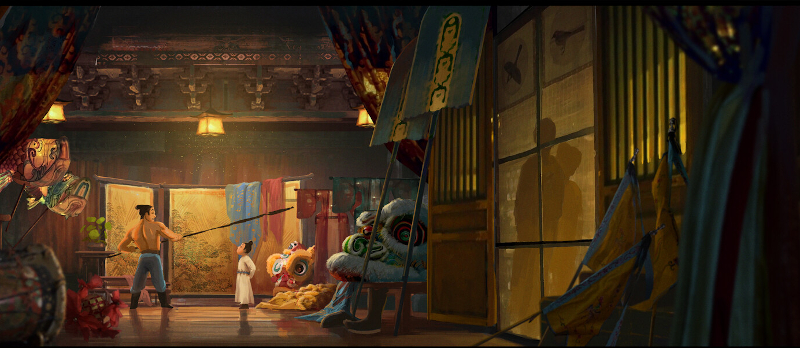
The two go their separate ways, with Gao heading to the city of Chang’an to perform with his spear before the local princess, only to find himself upstaged by poet and musician Wang Wei (voice: Qiuzai Jiang) who is considered more noble and therefore more deserving than he. In the palace, Gau also meets the young boy Du Fu (voice: Xiaoyu Liu) who offers the outsider helpful advice. Gao decides to go home, stopping off at Yangzhou where he finds Li frittering away money to impress female beauties and their families. He is challenged to a duel by a young woman Pei Shi’er (voice: Shimeng Li) who bests him, then explains that despite being the best swordsman in her family is barred from any sort of career on grounds of gender.
Li’s profligacy comes back to bite him. Later, visiting Gau at his family Shang Qui estate of Liaing Gsardens, he reveals that when his father died, Li had already spent his inheritance. Gao, too, makes mistakes, albeit of a very different nature: the experience of trying to ingratiate himself with a general whose main interest lies in surrounding himself with dancing girls makes an appearance in a poem Gao writes at the isolated Pujinyi Inn, soon to be the site of a minor military skirmish, which will cement Gau’s reputation as a poet – but, because it insults a member of the social class with the power to commission poetry, will ensure he will never get any paid work as such.
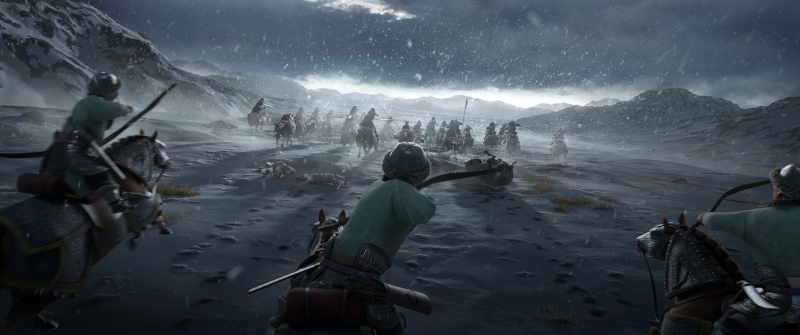
As the decades pass, and both men get older, further encounters follow with Li becoming a drunkard and then a Taoist acolyte (and still a drunkard, extolling the virtues of imbibing vast quantities of wine). The two men’s friendship becomes increasingly strained, and eventually events conspire to bring an arrested Li before the now regional governor, Gau.
There are recurring visuals of lone or flocks of eagles flying overhead as people make journeys on horseback, although whatever the idea behind the eagles is, it never amounts to anything significant.
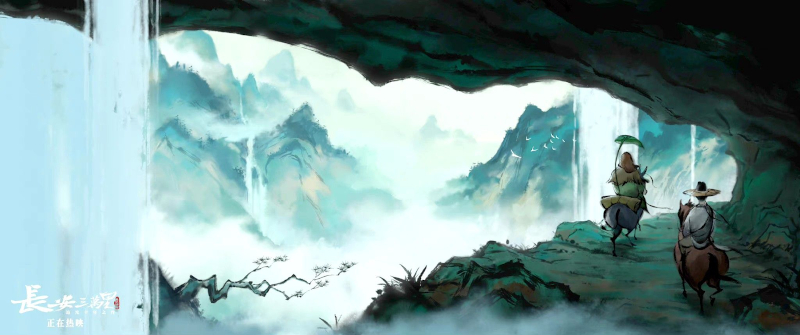
The piece is also punctuated both by lines by numerous Tang poets – many of whom, including the adult Du Fu (voice: Sun Lulu), appear briefly as characters – and visuals which replace the overall 3D computer animation style with a 2D flat style modelled after Tang period painting and calligraphy. The film doesn’t so much explore Tang poetry as deliver some 48 examples, which somewhat incredibly never outstay their welcome. The visuals are stunning, not just the brief fight, battle or action scenes, but also subtler moments such as horses trotting, with rounded bodies from having been well-fed (as in the art of the period) or grass blowing gently in the wind.
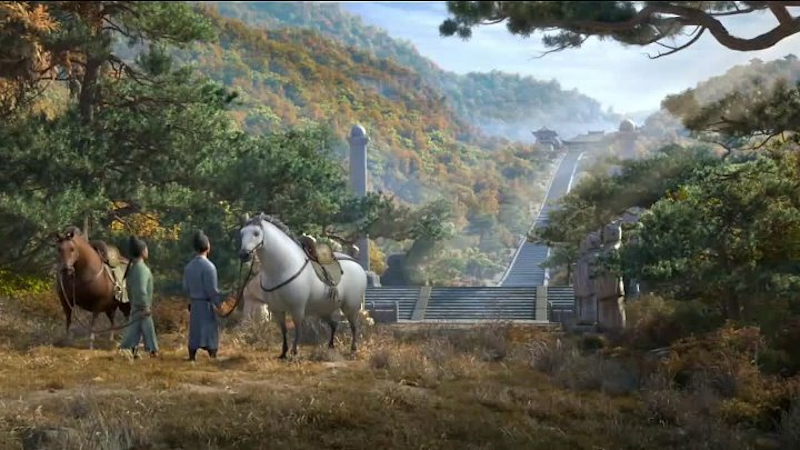
Despite running the best part of three hours, the whole thing is a leisurely feast for the eyes, a window on a fascinating piece of Chinese history and culture none too familiar to Westerners. The poster might make you think this a children’s film, yet while there’s no sex and only a little fighting and warfare, the film is aimed rather at grown up sensibilities. (Which is not to say that children won’t enjoy it – perhaps they will, but it’s very long, is subtitled, and doesn’t feel aimed at them particularly.)
While one can imagine the tale being made as live action, the medium of animation gives it something extra; at times, this Light Chaser Animation Studios production feels like it belongs in the worlds of Chinese art and calligraphy alongside classic Shanghai Animation Studio shorts Where is Mama?, Te Wei, 1960; The Cowboy’s Flute, Qian Jiajun, Te Wei, 1963; Feeling of Mountain and Water, Te Wei, Ma Kexuan, Yan San Chun, 1988). This, however, is not a short, but rather a hugely impressive, full-fledged feature film. Quite simply, an unexpected gem.
Chang’an is out in cinemas in the UK on Friday, February 28th. In Mandarin with English subtitles.
Trailer:
